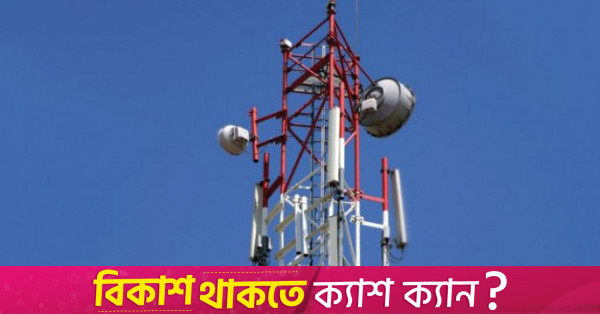How tower chaos hurting mobile phone users


Mobile phone users’ frustrations with poor network coverage, frequent call disruptions, and slow internet speeds are directly tied to the current chaotic tower network management, according to industry experts.
Mostly blaming limitations in the tower sharing guideline, they said the network infrastructure in Bangladesh lags behind peer countries despite having a growth potential.
To avert the risk of missing the train, the industry needs an easier, faster network expansion regime, they added at a discussion on how to solve the tower inadequacy problems, organised by the Bangladesh Mobile Phone Consumers Association in Dhaka today.
Bangladesh has 26 mobile towers for every 1 lakh people, which is 37 in Sri Lanka or India and much higher in countries like Cambodia, Vietnam, Laos and Malaysia, said Masuda Hossain, head of Regulatory Affairs at Edotco, a top tower operator in Bangladesh.
Citing the TowerXchange and Ronald Berger report, she said Bangladesh is projected to experience significant growth in mobile usage over the coming years.
“The number of 4G users is expected to rise to over 15 crore by 2028, up from less than 10 crore now. This surge will increase monthly per-user data consumption to 17.5 GB from 6 GB, while mobile data speeds are anticipated to grow from 10 Mbps to over 50 Mbps,” she added.
To support this growth, Bangladesh will need approximately 12,000 new towers in the next few years, with 5,000 more required by 2033, mentioned Masuda.
The tower chaos
Banglalink’s Chief Corporate and Regulatory Affairs Officer Taimur Rahman told The Business Standard that the 2018 Tower Sharing Guideline by the Bangladesh Telecommunication Regulatory Commission (BTRC) permitted the establishment of dedicated tower companies, or “towercos,” and restricted telecom operators from expanding their own towers.
This restriction has slowed the pace of network rollout, said Taimur.
Mohammed Shahedul Alam, chief corporate and regulatory officer at Robi Axiata, the second-largest mobile operator, added that tower sharing would not be problematic if the regulator did not implement the Significant Market Power (SMP) policy, which currently limits the role of the largest and most efficient tower company, Edotco.
As a SMP tower company in 2022, Edotco is now limited to serving no more than 30% of the industry’s demand for new towers per quarter or year. This restriction has compelled telecom operators to depend on the remaining three tower companies, which have yet to meet expectations, he told TBS.
Edotco, which owns 16,732 towers, is the leading tower company, followed by Summit Towers with 4,549 sites. The other two companies, despite having foreign partners, have yet to surpass the 1,000-tower milestone.
Meanwhile, Kirtonkhola, a joint venture between the local Confidence Group and the US firm American Towers, adopted a conservative approach over the past two years, avoiding aggressive pricing strategies due to macroeconomic challenges triggered by the Ukraine War.
In contrast, Frontier Towers Bangladesh, a joint venture involving global investor KKR, Singapore-backed Pinnacle Towers, and local AB Hightech Consortium Limited, exceeded Kirtonkhola by constructing sites in response to Grameenphone’s demand.
However, Frontier Towers struggled significantly to meet its financial commitments.
A group of 20 contractors which already constructed and delivered around 750 towers to Frontier now cry for their unpaid bills worth over Tk150 crore.
In a letter to the BTRC earlier this month, the Frontier Contractors’ Forum sought regulatory help to recover their money from the company.
They also alleged the tower company is getting money regularly from their client Grameenphone but not clearing their gigantic bills for the past six months, which was supposed to be done in 21 days.
Grameenphone Senior Director Corporate Affairs Hossain Sadat said Frontier failed to deliver towerco commitments to them and it cannot pay any bill to the other parties.
“The macroeconomic shock—rising interest rates and dollar price—hurt our cash flow significantly and we are trying to overcome it. We are paying our vendors every month based on what our cash flow supports and we are in talks to come up with a plan together,” said Md Saleheen, CEO of Frontier Towers.
Solutions proposed
Active sharing of network resources that allow a tower operator to serve multiple telecom operators at a time without further investments will help resolve the low return problem that leads to reluctance in investment or financial crisis, said Banglalink’s Taimur Rahman.
Allowing telecom operators to make new investments in towers, fibre cable networks along with the dedicated sub sector players will also mitigate the risk of non-delivery, said Robi Axiata’s Shahedul Alam.
Edotco’s Masuda Hossain said allowing new technologies in network infrastructure, letting tower operators commercially share solar energy with the national grid, reducing duty burden on network equipment imports, alongside introducing one stop services for network sites rollout would help.
Bangladesh Mobile Phone Consumers Association President Mohiuddin Ahmed while moderating the programme called for increased awareness that mobile tower radiation is well below the threshold as a fear in this regard increases challenges in new site setup.




